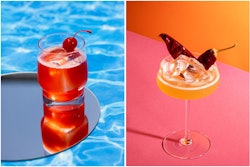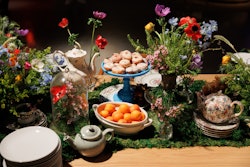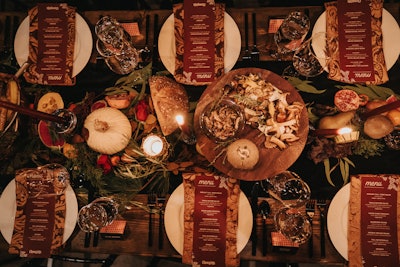
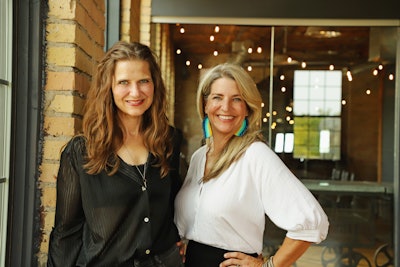 Chowgirls Catering co-founders Heidi Andermack (left) and Amy Lynn BrownPhoto: Courtesy of Chowgirls Catering
Chowgirls Catering co-founders Heidi Andermack (left) and Amy Lynn BrownPhoto: Courtesy of Chowgirls Catering
How they got their start: Neither woman had significant food and beverage experience prior to launching Chowgirls in 2004. Andermack was serving as business manager for her then-husband's font and art business, while also volunteering and helping curate food and drink for events in the local arts community. Through that work, she met Brown, who was working as a sales and marketing rep for Random House—and the two quickly hit it off. "Within a year of meeting, we started Chowgirls," remembers Andermack.
Brown points out that the pair both had "English degrees, marketing experience, and a love for entertaining. We came into catering in our mid-thirties, as second careers, thinking we’d try it out for a while and see if it stuck." Brown actually kept her day job for the first two years, working potential catering clients in between bookstore visits, weeks of business travel, and sales meetings. "At my last sales conference in New York, I met a new author, the Barefoot Contessa herself Ina Garten, and told her I’d recently launched a small catering company," she recalls. "Her advice to me was to be careful of what I wished for. 'Good caterers never lack for work,' she said. Shortly thereafter, Heidi and I realized that our 'already-kinda-popular' business was only going to keep growing with each passing month, and I was able to make the full leap into entrepreneurism."
What sets their company apart: Brown and Andermack both cite their business' focus on values. "When we started in 2004, there were no other caterers in the Twin Cities dedicated to using organic ingredients," Andermack notes. "That set us on a pathway to sustainability, which evolved to include composting and recycling, which opened the door to reducing waste through food rescue and eventually led us to community food production—creating meals for our neighbors in need—during the pandemic."
Since the death of George Floyd in 2020, the team has also dedicated more energy and resources to DEI initiatives. "We now have a council of employees who guide our business decisions and efforts to ensure we’re welcoming and respectful, inclusive, and equitable," she continues.
Brown says that the company's focus on values means it attracts and retains "great people who love their jobs. This seems pretty rare in catering, where seasonality, unpredictability, and the fact that it’s really hard work make employee retention particularly tough," she says. "We offer clients a diverse, happy, and engaged team year-round, from proposal to finish by working proactively to prevent burnout among our team. 'Safe, sane, and sustainable' has been our business model for many years, with 'sustainable' referring not only to our food sourcing but to the careers we offer our staff." Employees are offered training programs and opportunities for career advancement, along with perks like massage stipends and a daily family meal, she adds.
What innovation means to them: "Slow but steady innovations on every level keep our business growing," explains Brown, who believes that growth should always mean stronger systems, better operating procedures, and new career opportunities for staff. The team also revamped the 18-year-old brand in 2022, modifying its logo and launching four new sub-brands to better fit its range of clients. "It brought us to our first foray in online ordering, Chowgirls By-the-Box, which had been part of our vision for a few years; a luxury catering arm called Chowgirls Concepts; and an elevated bar program, Chowgirls Cordial, with its own stylish image."
Andermack adds that it's all about solving problems in an ethical way that looks beyond the mainstream. "It’s not always the easiest, and it takes a concerted effort, but we often see rewards in intangible and unexpected ways," she explains. "For example, our pathway to sustainability allowed us to participate in a pilot program to reduce waste during the Super Bowl in 2018 by donating leftover meals to Second Harvest Heartland. At the start of the pandemic, that connection grew deeper when our culinary director Liz Mullen reached out to see how we could partner. Within a few days, we started Minnesota Central Kitchen with Second Harvest Heartland (now called Kitchen Coalition), a community food production program to rescue food, feed our food-insecure neighbors, and provide jobs to unemployed chefs. That model carried our business for a full year and fed over one million people."
As the company approaches its 20th year in business, Andermack adds, "following our guts and our hearts has shown we can trust ourselves to be the innovators, inspiring others while staying on our toes in ways that lead to healthy growth." 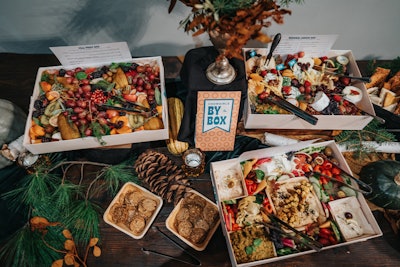 The team recently launched Chowgirls By-the-Box, which offers curated, deliverable versions of its most popular platters.Photo: Courtesy of Chowgirls Catering
The team recently launched Chowgirls By-the-Box, which offers curated, deliverable versions of its most popular platters.Photo: Courtesy of Chowgirls Catering
Memorable moments: Andermack recalls being inspired by the Feast of the Seven Fishes, a Sicilian Christmas Eve tradition, which "won my heart as a college student when a friend invited me to her family’s celebration," she says. "I later adopted the tradition, honoring my closest friends during the holiday season with an elaborate seven-course seafood dinner. The menu includes family recipes from my friends’ parents as well as dishes I learned while on a culinary tour of Italy and Sicily."
For Brown, one of her favorite career moments is from a recent "friends-giving" dinner the team hosted for venue partners in the Twin Cities. "We planned for an edible tablescape—with the majority of the dishes plattered family-style, woven in and out of fresh greenery, herbs, fruits, and vegetables into a candlelit vertical table runner," she recalls. "Butter lettuce salad with bright butternut squash, roasted winter vegetables, chimichurri, and rustically styled grilled sirloin rounded out the bulk of the pre-set dishes."
Brown also wanted to include a board concept that was a bit more conceptual than the standard cheese and charcuterie presentation. "Enter the mushroom board—an earthy and diverse offering highlighting our local cultivators. Cremini and pecan pâté, grilled oyster and trumpet mushrooms with orange and truffled chévre, and a local mushroom conserva were a nice match for wooden bowls of house-made focaccia, looking good and functioning as a great appetizer for omnivores and vegetarians alike," notes Brown.
Their all-time favorite foods: "Steak, salad, and baked potato, in the classic supper-club style with house-made bleu cheese dressing and a dinner roll," says Brown. "I love nearly every cuisine the world has to offer, but this is the simple comfort meal I’ve cherished the longest."
Andermack's answer is similar: "Grass-fed beef tenderloin with béarnaise, a dish my 16-year-old son has perfected. It warms my heart that my work has inspired his culinary curiosity," she says.
Their biggest hope for the F&B industry: "I’m hopeful that the trends toward organic, sustainable, and local fare will keep expanding at a hearty rate, despite inflation and other economic factors that might make small businesses wary of following their values," says Andermack.
Adds Brown, "As a female business owner, I’m encouraged by the slow-but-sure diversification of the industry and its leaders, bringing more focus not only to women but to marginalized culinary professionals around the country."





